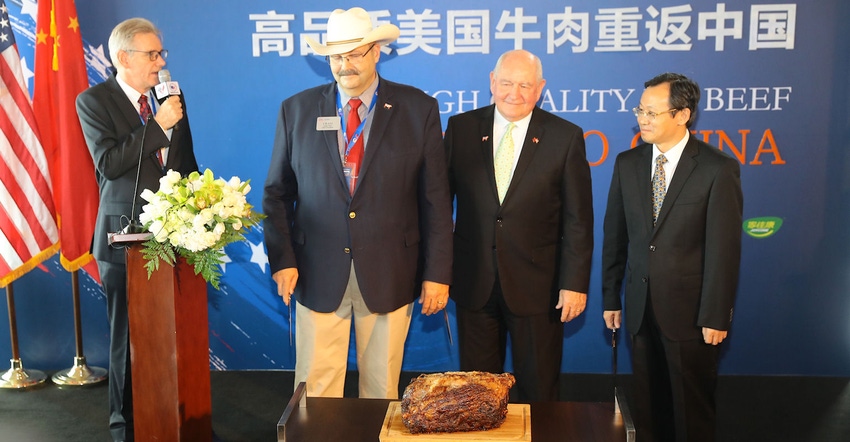Celebrations mark long-awaited U.S. beef’s return to China by beef groups along with Sec. Perdue and Ambassador Branstad.

U.S. Secretary of Agriculture Sonny Perdue joined with U.S. Ambassador to China Terry Branstad on June 30 to slice a Nebraska prime rib in a Beijing ceremony, formally marking the return of U.S. beef to the Chinese market after a 13-year hiatus after shipments were halted at the end of 2003 following the case of BSE.
The U.S. Meat Export Federation (USMEF) participated in a media reception marking the return of U.S. beef to China. Perdue and Branstad addressed attendees, along with National Cattlemen’s Beef Association (NCBA) President Craig Uden, a cattle feeder and rancher from Elwood, Neb. Other U.S. guests included Greg Ibach, director of the Nebraska Department of Agriculture, and NCBA president-elect Kevin Kester, a rancher from Parkfield, California. The reception was funded through support from the Nebraska Beef Council.
Joel Haggard, USMEF senior vice president for the Asia Pacific, emceed the event. He thanked Perdue and his USDA team for negotiating the final agreement that restored access for U.S. beef, which had been absent from the Chinese market since the December 2003 BSE case. The market officially reopened June 12.
Perdue said it was a great source of pride to be on hand for the official reintroduction of U.S. beef into China, and expressed his commitment to providing consumers with a high-quality product.
“On behalf of President Trump and the people of America, we want to say thank you to our great customers here in China,” Perdue said. “We want to respect your market and assure you that these products coming in are safe, wholesome and very delicious.”
Perdue also paid tribute to U.S. cattle producers, who are excited to finally be able to supply the Chinese market.
“To those men and women who go out in the cold and birth those calves, we want to thank you for what you do to make this day possible. I am convinced that when our Chinese friends taste this tasty, wholesome, healthy and safe U.S. beef, they’re going to want more of it. So you all better get some more cows,” he said.
The return of U.S. beef and beef products is a part of the U.S.-China 100-Day Action Plan announced by the Trump Administration on May 11, 2017, with the first shipment of U.S. beef arriving in China on June 19, 2017.
Perdue said, “This is also a good harbinger of the kind of relationship that can be developed. We hope there are other things we can cooperate on and we're going to use U.S. beef as the forerunner.”
Branstad, who was confirmed as U.S. ambassador to China on May 22, said the return of U.S. beef to China is an important step forward in expanding U.S. agricultural exports.
“This is an exciting day – we’ve been waiting nearly 14 years for this,” Branstad said. “I want to express my excitement that one of my first official duties as ambassador from the United States to the People’s Republic of China is to be here with my friend, Secretary of Agriculture Sonny Perdue, to welcome American beef back to China. I want to reiterate our commitment to expanding trade and increasing American exports, and we believe beef is a great beginning for this process.”
Uden echoed these sentiments, noting the excellent potential China holds for U.S. beef exports.
“I’m honored to be here today to celebrate this important milestone in the relationship between the United States and China,” Uden said. “This is a great day for U.S. beef producers, and we look forward to supplying U.S. beef to many Chinese consumers in the years to come.”
The appetite for American beef has grown tremendously in Asia in recent years, with Japan, South Korea, and Hong Kong rapidly becoming three of the world's top five importers of American-produced beef. NCBA said it will continue to fight for greater and fairer access to foreign markets for American producers.
"Regaining access to the world's largest market is a huge step in the right direction," Uden said. "But we still have a lot of work to do, like negotiating a bilateral trade agreement with Japan that puts us on even ground with our competitors, and ensuring that the renegotiation of NAFTA doesn't mess up the great deal we've had with our consumers in Canada and Mexico for years."
Perdue and Uden were joined by importer Luan Richeng, vice president of COFCO Group, for a ceremonial carving of U.S. prime rib – part of the first shipment of U.S. beef to arrive in China.
Also on Friday, Perdue held a series of meetings with Chinese government officials, including Vice Premier Wang Yang and Minister of Agriculture Han Changfu, to discuss expanding trade between the United States and China.
On July 1 in Shanghai, Perdue will help launch U.S. beef’s return to China’s commercial channels with a U.S. beef promotion at a City Super supermarket. He will be joined by USDA Foreign Agricultural Service representatives, Ibach (representing the state of Nebraska), USMEF staff and U.S. beef exporters. The group will distribute samples of U.S. steak cuts and chuck eye roll to City Super customers and speak to the unique attributes of U.S. beef. Funding support for this event was also provided by the Nebraska Beef Council.
“It has been a long road back for U.S. beef in China, and USMEF is extremely pleased to see such great enthusiasm for its return,” Haggard said. “Buyer interest is very strong, and we are excited about the opportunity to work with U.S. exporters and future customers in China to build a solid foundation for U.S. beef in this dynamic market.”
About the Author(s)
You May Also Like




.png?width=300&auto=webp&quality=80&disable=upscale)
